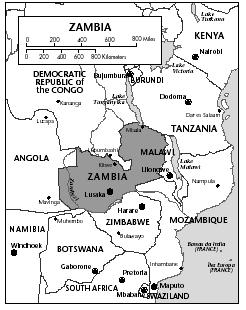Zambia - Rise to power
When Mwanawasa took office on 2 January 2002, he became the first member of the Lenje ethnic group to become president of Zambia. In fact, until he took office, all previous presidents had been Bembas. He first became involved in the government when he was appointed solicitor general in 1985, but this role was really an extension of his profession as a lawyer. In July 1990, his predecessor, Frederick J. T. Chiluba, helped bring about the legalization of opposition parties, and Chiluba became the president of the new Movement for Multiparty Democracy (MMD). Following the enactment of the country's new Constitution in 1991, elections were held and Mwanawasa joined the newly elected Chiluba administration as vice president. He resigned in July 1994 before serving the complete term after suffering serious injuries in an automobile accident. At the time of his resignation, Mwanawasa cited corruption in the government as a contributing factor in his decision. Following an unsuccessful campaign for president of MMD, Mwanawasa left politics in 1996. He returned to his law practice, putting aside his involvement in the country's government.
In August 2001, the MMD designated Mwanawasa as its presidential candidate for the 2001 elections. (The Constitution limits the president to two five-year terms, so Chiluba was ineligible to run for reelection.) Mwanawasa was declared the winner following the 27 December 2001 balloting, but with less than 29% of the vote, he did not have a clear mandate from the electorate. Among the eleven candidates on the ballot for president, Mwanawasa was one of three former vice presidents running. Opposition candidates protested the election, alleging that Mwanawasa was former president Frederick Chiluba's hand-picked candidate, and that the election was rigged to keep power in MMD's hands.

Protestors in the streets following the election results claimed they voted for change, but the government imposed the status quo. The opposition UPND candidate, Anderson Mazoka, who was the runner-up to Mwanawasa, lodged a protest with the Supreme Court, claiming "We will never recognize Mwanawasa's illegitimate election and will pursue a multi-pronged legal campaign to have his victory nullified."
Mwanawasa's margin of victory over Mazoka, a wealthy businessman, was estimated by various agencies as 11,000, 33,000, or 35,000 votes. Mwanawasa's support in Parliament was weak, with his party winning 69 of 159 seats. However, as he took bold steps to follow through on his campaign promises in the early weeks of his administration, opposition parties were grudgingly aligning with his government.
Comment about this article, ask questions, or add new information about this topic: